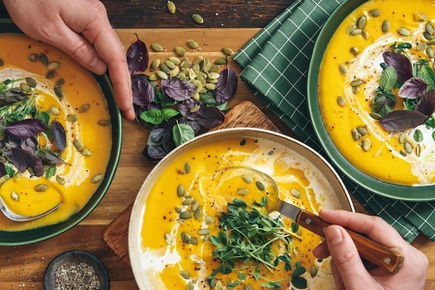.jpg?width=525&height=350&format=jpg&quality=95)
No eggs? Here's Some Handy Substitutes
Nicola Perry APD
If the recent egg shortage has put a crack in your cooking repertoire, we've got some simple swaps to supercharge your brekkie and baking with these egg-free alternatives.
“Eggs are incredibly nutrient-dense, loaded with 13 essential vitamins and minerals including protein, vitamin D, B vitamins and folate. But if you need a back-up, there are great alternatives that can work just as well and still support your nutrition,” says Sanitarium Accredited Practising Dietitian, Nicola Perry.
So, what can you use instead of eggs?
Nicola breaks down some of the most useful egg swaps, how to use them, and how they compare nutritionally.
“When you’re swapping out eggs, it’s not always about finding a like-for-like nutrition swap. It depends on the recipe and the role the egg plays – whether it’s binding, lifting, adding richness or moisture,” says Nicola.
“For vegans, in particular, it can be helpful to choose egg alternatives that contain the nutrients, vitamins and minerals that are harder to get from plants like omega 3 fatty acids, iron and protein,” says Nicola.
Below Nicola outlines some great egg replacement options.
1. Ground Flaxseed or Chia Seeds
How to use: For each egg you’re replacing, mix one tablespoon of seeds with three tablespoons of water. Let the mixture sit for 15 minutes. If you’re using flaxseeds, put the mix in the fridge while it sets. This alternative works well in baking, especially muffins, pancakes, and brownies.
Nutrition: A good source of omega-3 fatty acids, some plant-based protein, fibre, iron and zinc.
Nicola says: “These little seeds are fibre-rich and a great way to get more healthy fats into your baking.”
2. Silken Tofu
How to use: Use ¼ cup of blended silken tofu to replace one egg. For lighter, fluffier results, add ¼ teaspoon baking soda to your recipe. Silken tofu is great in biscuits, dense and moist cakes, creamy desserts and bread where it helps bind and add moisture.
Nutrition: Contains protein, iron and calcium when calcium-set tofu is used.
Nicola says: “Silken tofu is underrated in recipes. It blends smoothly into batters, offering structure and richness without altering the flavour. It’s a fantastic all-rounder egg replacement for sweet or savoury bakes. My personal favourite is in ‘cheesecakes’.”
3. Greek Yoghurt
How to use: Swap in ¼ cup of plain Greek yoghurt (or a thick, plant-based alternative) for each egg. This alternative shines in muffins, cakes and breads where it helps to bind and add moisture.
Nutrition: Adds protein, calcium, and iodine and B12 if opting for a fortified plant-based version.
Nicola says: “Greek yoghurt is especially useful for vegetarians looking to add protein to baking. It’s creamy and adds moisture, while also delivering important minerals like calcium.”
4. Oil Plus Baking Powder
How to use: Whisk together two tablespoons of water, one tablespoon oil and two teaspoons baking powder to replace one egg. This combination works best when you’re just missing a single egg. Ideal for biscuits, muffins, or to brush over pastry instead of an egg wash.
Nutrition: Adds healthy fats depending on the oil you choose.
Nicola says: “Try to use an oil that offers nutritional benefits – extra virgin olive oil is my top pick. Just be mindful of the quantity – more than one egg’s worth and the recipe might turn out greasy.”
5. Nut Butter
How to use: Use three tablespoons of smooth nut butter per egg. This substitute works best in cookies, pancakes or dense bakes like brownies.
Nutrition: High in protein, healthy fats, iron and zinc.
Nicola says: “Nut butters offer a flavour twist, so choose recipes where the nutty taste will complement the other ingredients. They also help boost satiety thanks to their healthy fat and protein content.”
6. Mashed Banana
How to use: Use ¼ cup of mashed ripe banana for each egg. Bananas are best in baked goods where a little added sweetness and moisture are welcome such as cakes, muffins, and pancakes.
Nutrition: Bananas offer potassium and fibre.
Nicola says: “Mashed banana is a great way to use up overripe fruit and can help you cut back on sugar from elsewhere in the recipe.”
7. Aquafaba
How to use: Use three tablespoons of the aquafaba (the liquid from cooked or canned chickpeas) per egg. It mimics egg whites particularly well when whipped, making it a perfect choice for meringues, pavlovas or mousses.
Nutrition: Minimal.
Nicola says: “Aquafaba is high in galacto-oligosaccharides (GOS) FODMAPs, which can cause bloating or discomfort for people with IBS or FODMAP sensitivities. If that’s you, it’s best to avoid using it,” says Nicola.

The latest nutrition advice, plus health and wellness tips delivered to your inbox monthly
.jpg?width=435&height=290&format=jpg&quality=95)
